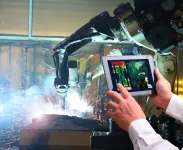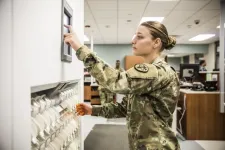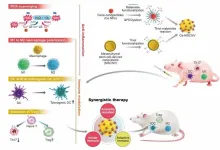(San Antonio, October 26, 2023) -- The Cybersecurity Manufacturing Innovation Institute (CyManII) at The University of Texas at San Antonio (UTSA) has been selected by the U.S. Economic Development Administration (EDA) to establish an ecosystem that will promote secure manufacturing strategies across South Texas. The Secure Manufacturing in South Texas Strategy Development Consortium, funded by a $500,000 Tech Hubs Strategy Development Grant, will enable CyManII to take initial steps to develop a Secure Manufacturing Tech Hub that will mature technologies, enhance business competitiveness and grow a skilled workforce in the region.
The federal government’s new Tech Hubs program, authorized by the bipartisan CHIPS and Science Act, is an economic development initiative designed to drive regional innovation and job creation. It strengthens a region’s capacity to manufacture, commercialize and deploy technology that will advance American competitiveness by investing directly in burgeoning, high-potential U.S. regions and transforming them into globally competitive innovation centers. Designation is an endorsement of a region’s plans to supercharge its respective technological industries to create jobs, strengthen U.S. competitiveness and protect national security.
The outcomes of this initial 18-month project will make UTSA and its partners more competitive for future Tech Hubs funding opportunities.
“Anchored by UTSA, San Antonio is home to a robust cybersecurity ecosystem and has a leading role to play in helping United States manufacturers compete with the rest of the world,” said JoAnn Browning, UTSA vice president for research, economic development, and the knowledge enterprise. “CyManII’s new consortium will pave the way for high-paying, high-demand jobs, enhance our nation’s competitiveness, and identify industrial security solutions that can be replicated across the nation to strengthen and protect American manufacturers.”
Each year, over $250 billion in U.S. research helps drive forward innovations relevant to advanced manufacturing, according to the National Center for Science and Engineering Statistics. However, small and medium-sized manufacturers struggle to participate in this increasingly digital economy. While the initial barriers to digitalize their processes have decreased due to more affordable and readily available Internet of Things (IoT) solutions, small businesses often miss out on opportunities to save on energy costs or secure new business through smart contracting requirements.
At the same time, approaches to industrial cybersecurity today are often reactionary and rely on bolt-on solutions for added protection. The ease of digitalization through affordable off-the-shelf IoT allows manufacturers to connect their businesses quickly and sometime haphazardly without considering the cybersecurity risks they may be introducing to their own businesses and even to their customers.
“Cybersecurity among our increasingly connected manufacturing ecosystem is a matter of national security since weaknesses and digital vulnerabilities among advanced manufacturers can quickly become a threat to entire supply chains,” said Howard Grimes, CEO of CyManII. “To remain globally competitive, Texas manufacturers need accessible cybersecurity technologies at scale.”
Currently, researchers are developing new approaches for embedded security that offer inherent protections against cyber threats. However, many of these innovations remain in development stages in a lab setting or one-of-a-kind demonstrations. In San Antonio, for example, groundbreaking approaches to ensuring cybersecurity of automated production systems are underway at CyManII. Although companies have shown interest in these innovations, significant efforts are needed to translate these innovations from bespoke code, processes and models into ready-to-use tools that can be easily accessed and deployed by average manufacturing enterprises. Further, many of these concepts and computational methods are novel and require a workforce with custom knowledge to build and deploy the technology.
The Secure Manufacturing Consortium aims to conduct development activities over an 18-month period that will prepare the region for success. CyManII will use its EDA funding to establish a consortium extending from the San Antonio – New Braunfels MSA to rural and underserved communities including Fredericksburg, Kerrville, Pearsall and Uvalde, Texas. The consortium will hire a regional innovation officer, develop an innovation roadmap to inform the Tech Hub design and grow its member-base.
The consortium’s new regional innovation officer will lead all development activities of the Tech Hub and ensure alignment with regional research, workforce and economic development priorities. Key responsibilities will include developing and engaging mission-critical relationships in the South Texas region, coordinating with research pipelines and end-users to facilitate technology transfer, and working with local and state government to align and co-fund workforce development efforts and inform business-friendly policies and incentives.
Additionally, this new hire will lead the creation of a roadmap to inform the Tech Hub implementation strategy. This roadmap will consider market data to determine regional needs and capabilities. It will assemble detailed workforce data, job data and market surveys to understand barriers to underserved populations participating in the secure manufacturing workforce. Additionally, it will include a Tech Hub development plan, a projection for job creation and economic impact, an intellectual property policy management plan, a climate risk plan and an equity plan.
CyManII will also strengthen engagement of and collaboration among regional stakeholders to support start-ups and tech transfer activities. This outreach will establish broader commitment from the State and regional government authorities by working with other UTSA offices.
“UTSA’s pioneering education, research, and community engagement programs in cyberspace and defense play a vital role in bringing jobs to South Texas and making San Antonio a center of innovation,” said Congressman Joaquin Castro (TX-20). “This foundational work to develop a Tech Hubs program in our region will drive important new investments in our workforce and strengthen America’s position as a global manufacturing leader. At the same time, it will catalyze economic growth through tech jobs that focus on cybersecurity, coding, engineering, secure manufacturing, and software integration.”
U.S. Congressman Henry Cuellar (TX-28) added, “The impact of the Tech Hubs Strategy Development Grant cannot be overstated. The Secure Manufacturing in South Texas Strategy Development Consortium will help transform South Texas into a new cybersecurity and technology manufacturing hub within the United States.”
The South Texas region is primed to become a global leader in cybersecurity technologies for advanced manufacturing and industrial systems. UTSA is the only Hispanic Serving Institution in the nation with three Center of Excellence designations from the U.S. Department of Defense (DoD) and National Security Agency. Likewise, the presence of the defense industry, strong research capacity, large manufacturing footprint and a ready workforce create an opportunistic nexus that is not replicated anywhere else. Additionally, the region has an extensive workforce development network in place to support the cybersecurity job pipeline, ranging from K-12 to Ph.D.
CyManII has leveraged this infrastructure (over 20 partner programs) to create focused curricula around industrial cybersecurity. In addition, consortium members and partners have numerous programs that already support cybersecurity and advanced manufacturing job pathways including the Cyber-Texas Foundation, Texas Federation for Advanced Manufacturing Education, The Texas Manufacturing Assistance Center and the Bexar County Military and Veterans Service Center.
CyManII was established under the U.S. Department of Energy in 2020 to combat vulnerabilities and drive fundamentally new innovations in industrial security. As a Manufacturing Innovation Institute with a focus on TRL 2-6 research, CyManII aims to enhance industrial competitiveness of U.S. manufacturers by informing technologies that enable secure digitalization. Supported with $70 million in federal investments, $42 million in cost-share from university and industry partners and $2.4 million in Texas state investments, CyManII and its partners have established the nation’s expertise in applied industrial security.
END








